Papers by Matthew Kruger-Ross

A cursory look at current education policy suggests a transformation of education into something ... more A cursory look at current education policy suggests a transformation of education into something analogous to job training. The purpose of such policy is to orient education to fit the needs of a technologically oriented market system. The related demand to quantify all student progress is a manifestation of the instrumental reason that has troubled the thinkers of modernity and capitalism. It finds its common measure in technology. Instrumental reason can be thought of as the stripping down of reason into inputs and outputs. The embrace of technology and its dominant form of reason has led to a crisis in curriculum and learning in general. Each wave of technological innovation promises to be better than the previous, more responsive and adaptive, and is sure to cure the ills of a broken university or education system. Though the ways of addressing the form of reason characteristic of technology are many, the key problem is the reduction of all human activity to narrowly defined ends.
An Alternative Framework for Course Evaluation & Redesign: Technological Pedagogical Content Knowledge of Teachers
The pace of technological innovation and the ever-evolving effects of technology on teaching and ... more The pace of technological innovation and the ever-evolving effects of technology on teaching and learning demand that schools and colleges of teacher education continually evaluate and redesign coursework. This study seeks to explore an alternative framework for graduate course evaluations using the Technological Pedagogical Content Knowledge (TPCK) as a lens. With a new framework, comes a transformation in the way the research team continues to build university courses that further the growth, development and ...
Teaching Heidegger: A conversation in community
Heidegger Circle Proceedings
If, as Lovitt (1977) declares, “Heidegger is primarily a teacher,” then how can interpreting Heid... more If, as Lovitt (1977) declares, “Heidegger is primarily a teacher,” then how can interpreting Heidegger’s thinking as acts of pedagogical relationality inform not only our understanding of his thinking but also who we are as teachers? Given the introduction of a new format for presentation, I am proposing an oral presentation and discussion to cultivate possible answers to this question. Attendees are profoundly teachers; it is a fundamental part of our scholarly lives. We teach who we are, and who we are has been influenced by our engaging with Heidegger’s thinking. In this conversation, we will share and reflect on our backgrounds as teachers and how we understand our teaching in connection to Heidegger’s philosophy and calls for a renewal in “thinking.”
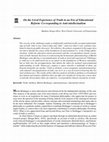
Critical Questions in Education, 2019
The severity of the challenges made to traditionally and historically accepted understand-ings of... more The severity of the challenges made to traditionally and historically accepted understand-ings of truth, what is true, what is false and "fake," and even what is real, continues unabated in American public discourse. Nevertheless, the primary argument in this paper does not aim to identify the causes of the breakdown of representation (i.e. in the Trump administration , within the education reform movement) and the correspondence-based conceptions of truth. Instead, the focus is on discussing the hermeneutic phenomenology of Martin Heidegger and offering a conceptualization of truth as lived and experienced. Challenges to truth are to be understood not as an attack on the foundations of Western rationality, but as built into the presuppositions that inform the taken for granted representational understanding of truth. Democracy requires a space whereby a multitude of ideas can flourish alongside one another. Truth as aletheia, a more pragmatic and phenomenologically-attuned conceptualization of truth, can serve as a way forward in honoring this key tenet of democracy. The results of this reflective analysis of truth as aletheia is a broadened description and tentative definition that can offer new insights for living into a more democratically driven future than can reductive, correspondence-based conceptions of truth.
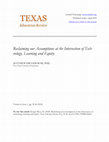
Texas Education Review, 2018
Assumptions: we cannot help but make them, rely on them, and take them for granted. Assumptions n... more Assumptions: we cannot help but make them, rely on them, and take them for granted. Assumptions not only ground and inform our worldviews and frames of reference (Mezirow, 2000) but also serve as the foundational building blocks for our meaning making as human beings. For example, for me to write this sentence I must presuppose or assume that the reader will already possess fluency in the grammar, syntax, and mechanics of the English language. I select vocabulary and phrasing that I assume will be meaningful for readers, and that will engage their thinking and sustain their attention. Try as we might, humans cannot interact and engage with people and the world around us without presupposing a great deal. Given the number of presuppositions (or assumptions, I use the terms interchangeably) that provide the context and texture for our meaningful lives, recognizing and naming this never-ending stream of assumptions is impossible. At some point, we must take a step and trust (assume) the ground will meet our foot.
While Heidegger is widely regarded as the most influential philosopher of the twentieth century, ... more While Heidegger is widely regarded as the most influential philosopher of the twentieth century, he is often understood and interpreted solely as a philosopher. To be sure, most of the published works that we take as Heidegger's books or texts are, in fact, transcripts of lecture courses. They are notes, asides, stories, and responses to a room of people, of students. There are new pathways to explore when we read Heidegger's thinking as accounts of pedagogical relationality, rather than as a collection of assertions polished into publishable manuscripts. Coincidentally, this revelation is as a result of Heidegger's edict on language.
I regularly teach an online graduate courses for educators on teaching and learning online. Unfor... more I regularly teach an online graduate courses for educators on teaching and learning online. Unfortunately, almost every version of the course that I've taught or seen begins with the assumption that we can take what we know about teaching in the physical classroom and directly apply it to the online environment. The best versions of this type of class acknowledge that you cannot just copy and paste from the face-to-face to the digital. What's more, most (if not all) approaches to understanding online teaching and learning rarely consider what conception of education is being assumed.

A cursory look at current education policy suggests a transformation of education into something ... more A cursory look at current education policy suggests a transformation of education into something analogous to job training. The purpose of such policy is to orient education to fit the needs of a technologically oriented market system. The related demand to quantify all student progress is a manifestation of the instrumental reason that has troubled the thinkers of modernity and capitalism. It finds its common measure in technology. Instrumental reason can be thought of as the stripping down of reason into inputs and outputs. The embrace of technology and its dominant form of reason has led to a crisis in curriculum and learning in general. Each wave of technological innovation promises to be better than the previous, more responsive and adaptive, and is sure to cure the ills of a broken university or education system. Though the ways of addressing the form of reason characteristic of technology are many, the key problem is the reduction of all human activity to narrowly defined ends.
In what follows we explore one way that curriculum may be able to engage meaningfully with the seemingly never ending cycle of new technologies in education. We argue that curriculum cannot respond to any such crisis of technology without embracing the concrete characteristics of human action and experience. We elaborate on philosopher Martin Heidegger's notion of " world " as it offers a greater ontologically sensitivity that can greatly benefit further curricular and educational inquiry.
North Carolina's Sixth Graders Go to Russia A global Education/curriculum Integration Project that Redefines the Virtual Field Trip and Makes Social Studies Education in a Technology Enabled Environment Meaningful and Exciting
Computers & Education, 2013
and sharing with colleagues.
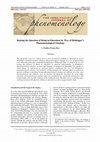
The aim of what follows is to explore how to raise the question of Being in education by way of H... more The aim of what follows is to explore how to raise the question of Being in education by way of Heidegger’s phenomenological ontology. Phenomenological ontology is a way of approaching and conducting philosophy exemplified in the work of German philosopher Martin Heidegger, and specifically demonstrated in his magnum opus Being and Time. In preparation to raise the question of Being a more nuanced understanding of Heidegger’s phenomenological analyses on truth and language are summarized. Following, the manner in which Being is referenced is analyzed before considering the way of Heidegger’s phenomenological ontology. In conclusion, existing attempts and continuing efforts into the question of Being in education through phenomenological ontology are shared. At a time when decontextualized and reductive ways of knowing and being are becoming the norm within education, phenomenological ontology offers new possibilities for scholarship and practice. The present inquiry does not offer solutions in the traditional sense but rather traces a path that opens and keeps in tension the question of Being in education in order to support further study.

Approaching the ground of our assumptions about educational technologies
Using transformative learning theory (Mezirow & Taylor, 2009) as a springboard, this chapter will... more Using transformative learning theory (Mezirow & Taylor, 2009) as a springboard, this chapter will begin to lay the groundwork for a critical perspective on educational technologies. Before the assumptions of Feenberg’s critical theory of technology are examined, I use phenomenology to uncover commonly held presuppositions about educational technologies. Feenberg situates his approach in three perspectives towards technology: determinist, substantivist, and instrumentalist. This chapter will critique the way these perspectives generate reductive understandings in education. In the second half of the chapter, Martin Heidegger’s (1977) philosophy of technology defined as the Enframing of Being will be presented. After situating Heidegger’s reflections on technology within the whole of his thought, his concept of Enframing will be offered as an additional critical viewpoint to be used alongside the more recent philosophies that comprise the critical theory of technology today. Rather than letting our presuppositions think for us (Egan, 1978), educators must be encouraged to recognize, reclaim, and critically reflect on the assumptions that inform their practices with technology. I argue that questions about integrating technologies into education need to be addressed at the foundational level of our assumptions about technology and not at the level of our technical skill.

Connecting critical theory of technology to educational studies
Journal of Transformative Education, Jun 4, 2014
In this article, I explore how transformative learning theory, an approach to educating drawn fro... more In this article, I explore how transformative learning theory, an approach to educating drawn from adult education, can be used to provide access to the critical theory of technology for educators. Rather than focusing primarily on K–12 teachers and educational systems or higher education and other postsecondary instruction, I connect learning as a human capacity with the critical approach to technology. Beginning with a discussion of assumptions and how they structure our ability to make meaning within two common perspectives on technology, instrumentalism and substantivism, an overview of the basic framework of the critical theory of technology is shared and situated among the assumptions made by current perspectives toward technology. Transformative learning theory is then presented as a possible connective thread that could be used to assist educational researchers and practitioners embrace a more critical approach to technology in education.
Ways of being a teacher: An alternative to the limits of teacher dispositions
Effective or Wise: Teaching and Assessing Professional Dispositions in Education
Education, Meet the Critical Theory of Technology - Introducing Feenberg’s critical theory of technology to empower and enlighten educational discourse surrounding technology
Teaching and learning as worlding: Beginning an ontology
On the being of teaching: Teaching as worlding

Temporalizing Pedagogy and Technology: Pressing into the Future
Hybrid Pedagogy, Sep 12, 2013
In Being and Time, Martin Heidegger writes with surprising brevity, “Temporality temporalizes as ... more In Being and Time, Martin Heidegger writes with surprising brevity, “Temporality temporalizes as a future which makes present in the process of having been.” While we may speak and write of a distinct past, present, and future, when we stop and think about how we experience time, a glimmer of possibility, an opening appears. As we look to tomorrow, we hold expectations of what will happen based on what is occurring around us right now and also based on what has happened to us before. Heidegger’s insight is the singularity in our experience of time.
I am most interested in sponsoring thoughtful and inclusive conversations to help me answer a simple question: Do online and collaborative technologies transform how we teach and how students learn? I want to use the clearing this question opens to challenge claims that we should be preparing students for a “21st Century” or for jobs in an “uncertain economy.” Even if these aims of education were legitimate, they are founded on some troubling assumptions, namely that education is under the sway of technology. Returning to Heidegger’s temporality, it is human beings whose everyday experience of time shapes how we encounter and understand technologies. The clearing the question provides allows us to see that we have a great deal of say over the charting of our educational future and the role technologies play.
Metropolitan Universities, Sep 2012
The use of educational technologies is grounded in the assumptions of teachers, learners, and adm... more The use of educational technologies is grounded in the assumptions of teachers, learners, and administrators. Assumptions are choices that structure our understandings and help us make meaning. Current advances in Web 2.0 and social media technologies challenge our assumptions about teaching and learning. The intersection of technology and education is subversive as it urges educators and learners to deconstruct and critically reflect on unexamined assumptions about learning.
A Plea for Pedagogy
Hybrid Pedagogy, Aug 8, 2013
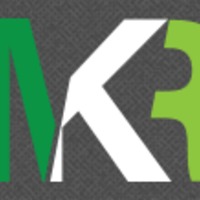







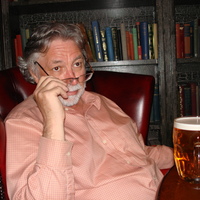
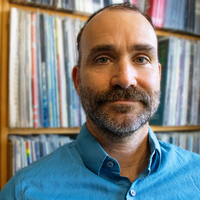

Uploads
Papers by Matthew Kruger-Ross
In what follows we explore one way that curriculum may be able to engage meaningfully with the seemingly never ending cycle of new technologies in education. We argue that curriculum cannot respond to any such crisis of technology without embracing the concrete characteristics of human action and experience. We elaborate on philosopher Martin Heidegger's notion of " world " as it offers a greater ontologically sensitivity that can greatly benefit further curricular and educational inquiry.
I am most interested in sponsoring thoughtful and inclusive conversations to help me answer a simple question: Do online and collaborative technologies transform how we teach and how students learn? I want to use the clearing this question opens to challenge claims that we should be preparing students for a “21st Century” or for jobs in an “uncertain economy.” Even if these aims of education were legitimate, they are founded on some troubling assumptions, namely that education is under the sway of technology. Returning to Heidegger’s temporality, it is human beings whose everyday experience of time shapes how we encounter and understand technologies. The clearing the question provides allows us to see that we have a great deal of say over the charting of our educational future and the role technologies play.
In what follows we explore one way that curriculum may be able to engage meaningfully with the seemingly never ending cycle of new technologies in education. We argue that curriculum cannot respond to any such crisis of technology without embracing the concrete characteristics of human action and experience. We elaborate on philosopher Martin Heidegger's notion of " world " as it offers a greater ontologically sensitivity that can greatly benefit further curricular and educational inquiry.
I am most interested in sponsoring thoughtful and inclusive conversations to help me answer a simple question: Do online and collaborative technologies transform how we teach and how students learn? I want to use the clearing this question opens to challenge claims that we should be preparing students for a “21st Century” or for jobs in an “uncertain economy.” Even if these aims of education were legitimate, they are founded on some troubling assumptions, namely that education is under the sway of technology. Returning to Heidegger’s temporality, it is human beings whose everyday experience of time shapes how we encounter and understand technologies. The clearing the question provides allows us to see that we have a great deal of say over the charting of our educational future and the role technologies play.
Developing an accurate timeline of Heidegger’s teaching is challenging for at least two reasons. First, records of announced courses and seminars are spotty at best and, second, regularly the course that Heidegger announced at the beginning of term to the administration ended up not being the course he taught at all. The most up-to-date listing of Heidegger’s teaching activity from 1915 to 1930 is chronicled in English and German by Theodore Kisiel and Thomas Sheehan in Becoming Heidegger: On the trail of his early occasional writings, 1910-1927 (pp. xl to lvii). A truncated listing of this period is listed below on the basis of this work. The most complete list of Heidegger’s teaching activity in German is included in William Richardson’s Heidegger: Through Phenomenology to Thought (pp. 663-671). Building primarily from the Gesamtausgabe and Richardson’s text, I have provided a draft of Heidegger’s teaching from 1930 to 1973. As one trajectory of my future scholarship will include exploring Heidegger as a teacher, this list will continually be updated and revised.